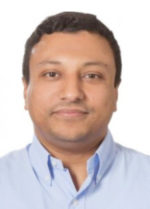Precise Engineering of Heterostructured and Doped Nanomaterials for High-Performance and Flexible Supercapacitors
Prof. Ahmed S. G. Khalil
Environmental and Smart Technology Group (ESTG), Faculty of Science, Fayoum University, EgyptThe advantages of supercapacitors (SCs) over batteries include quicker charge/discharge rates, higher power density, longer life cycles, and flexibility. SC efficiency is highly dependent on the electrode's material properties. Various materials have been tested; however, carbon-based materials are widely recognized as excellent candidates for enhancing SC performance. In recent years, significant efforts have been made to engineer the interface of various heterostructured electrodes, such as tuning the size and morphology of their nanocomponents, introducing dopants, and utilizing low-cost synthesis and processing techniques.
In this talk, we will highlight our group's activities in developing high-performance electrodes for SCs. Catalytic chemical vapor deposition (CCVD) and solvothermal methods were employed to synthesize iron oxide/MWCNT heterostructures with tuned phase, size, and morphology. The heterostructure-based electrodes demonstrated superior specific capacitance, energy density, and cycling stability. The size of iron oxide nanoparticles and nanoplatelets, as well as the diameter and number of walls of the functionalized MWCNTs, were optimized. Density Functional Theory (DFT) was used to determine the quantum capacitance of the developed heterostructures. In another project, efficient use of natural resources was achieved by utilizing the lignin component of sugarcane bagasse waste. The isolated lignin was employed as a carbon precursor in the preparation of lignin/PES composites. Laser carbonization was employed as a low-cost technique to produce 3D porous carbon for flexible micro-supercapacitor applications. Another strategy to enhance the properties of laser-induced graphene (LIG) involved doping the polyimide films with heteroatoms such as boron and nitrogen and incorporating 2D materials like molybdenum disulfide (MoS2) into the polyimide matrix. The polyimide and its composite films have been fabricated and then subjected to a CO2 laser under well-determined parameters to induce the formation of graphene-based heterostructures. These novel electrodes have shown excellent electrochemical properties compared to other reported electrodes. Recently, we have also explored the development of 3D fibrous electrodes for flexible SCs. Graphene, MoS2, and MXenes nanosheets have been utilized to form the heterostructured fibers. Their synthesis has been carefully optimized to achieve rheological properties suitable for stable fiber spinning. The resulting composites exhibit synergistic effects, leading to superior conductivity, facilitated ion transport pathways, and enhanced electrochemical properties of the flexible SCs.
Short biography:
 Prof. Ahmed S. G. Khalil is a Full Professor of Materials Science and the head of the Environmental and Smart Technology Research Group (ESTG). He received his PhD in Physics and Materials Science in 2008 from the Max Planck Institute for Coal Research in Germany, and his B.Sc. and M.Sc. in Physics from Cairo University. Prof. Khalil has held positions as a Postdoctoral Associate at the University of Duisburg-Essen, a visiting scientist at IBM Research labs in Zurich, and at the University of California, Berkeley. His research focuses on developing functional nanostructures and membranes for applications in water purification, wastewater treatment, energy storage, and biotechnology. Prof. Khalil has authored over 90 papers in reputable international journals and has successfully attracted more than €8 million in funding. He is an elected member of the Arab-German Academy of Sciences and Humanities (AGYA) and founded EvoSmarTec GmbH in 2023, an innovative startup specializing in advanced materials and sustainable technologies.
Prof. Ahmed S. G. Khalil is a Full Professor of Materials Science and the head of the Environmental and Smart Technology Research Group (ESTG). He received his PhD in Physics and Materials Science in 2008 from the Max Planck Institute for Coal Research in Germany, and his B.Sc. and M.Sc. in Physics from Cairo University. Prof. Khalil has held positions as a Postdoctoral Associate at the University of Duisburg-Essen, a visiting scientist at IBM Research labs in Zurich, and at the University of California, Berkeley. His research focuses on developing functional nanostructures and membranes for applications in water purification, wastewater treatment, energy storage, and biotechnology. Prof. Khalil has authored over 90 papers in reputable international journals and has successfully attracted more than €8 million in funding. He is an elected member of the Arab-German Academy of Sciences and Humanities (AGYA) and founded EvoSmarTec GmbH in 2023, an innovative startup specializing in advanced materials and sustainable technologies.

